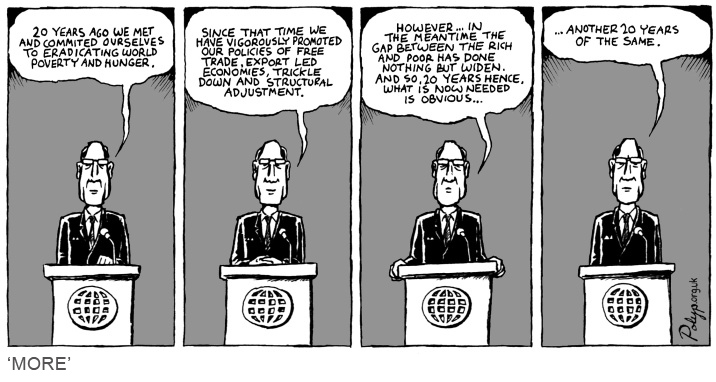This was published just before the “resolution” of negotiations. What changed? Details of how we’re screwed.

As negotiators and ministers from the United States and 11 other Pacific Rim countries meet in Atlanta in an effort to finalize the details of the sweeping new Trans-Pacific Partnership (TPP), some sober analysis is warranted. The biggest regional trade and investment agreement in history is not what it seems.
You will hear much about the importance of the TPP for “free trade.” The reality is that this is an agreement to manage its members’ trade and investment relations – and to do so on behalf of each country’s most powerful business lobbies. Make no mistake: It is evident from the main outstanding issues, over which negotiators are still haggling, that the TPP is not about “free” trade…
For starters, consider what the agreement would do to expand intellectual property rights for big pharmaceutical companies, as we learned from leaked versions of the negotiating text. Economic research clearly shows the argument that such intellectual property rights promote research to be weak at best. In fact, there is evidence to the contrary: When the Supreme Court invalidated Myriad’s patent on the BRCA gene, it led to a burst of innovation that resulted in better tests at lower costs. Indeed, provisions in the TPP would restrain open competition and raise prices for consumers in the US and around the world – anathema to free trade…
Similarly, consider how the US hopes to use the TPP to manage trade for the tobacco industry. For decades, US-based tobacco companies have used foreign investor adjudication mechanisms created by agreements like the TPP to fight regulations intended to curb the public-health scourge of smoking. Under these investor-state dispute settlement (ISDS) systems, foreign investors gain new rights to sue national governments in binding private arbitration for regulations they see as diminishing the expected profitability of their investments…
To be sure, investors – wherever they call home – deserve protection from expropriation or discriminatory regulations. But ISDS goes much further: The obligation to compensate investors for losses of expected profits can and has been applied even where rules are nondiscriminatory and profits are made from causing public harm…
Imagine what would have happened if these provisions had been in place when the lethal effects of asbestos were discovered. Rather than shutting down manufacturers and forcing them to compensate those who had been harmed, under ISDS, governments would have had to pay the manufacturers not to kill their citizens. Taxpayers would have been hit twice – first to pay for the health damage caused by asbestos, and then to compensate manufacturers for their lost profits when the government stepped in to regulate a dangerous product.
It should surprise no one that America’s international agreements produce managed rather than free trade. That is what happens when the policymaking process is closed to non-business stakeholders – not to mention the people’s elected representatives in Congress.
That presumes, of course, that our Congress is up to performing required due diligence on behalf of American workers and their families. Something I still need to be convinced of.